1 March 2019 — Americans for Democracy & Human Rights in Bahrain (ADHRB) takes this opportunity to make an intervention under the Ítem 3 Clustered Dialogue with the Special Rapporteurs on Privacy and on Cultural Rights during the 40th Session of the United Nations Human Rights Council. During her speech, Margaret McIntyre discussed the negative impact that cyber surveillance plays on privacy rights in the United Arab Emirates (UAE). McIntyre asked the Rapporteur on Privacy to recommend steps the UAE could take to better protect its citizens’ privacy rights. Please continue reading for the full text of the statement, or click here for a PDF of her remarks.
—
Mr. President,
IDO and ADHRB would like to bring to the attention of Special Rapporteur Cannataci the negative impact that cyber surveillance plays on privacy rights in the United Arab Emirates.
The UAE built and maintains a sophisticated cyber surveillance framework from which it spies on its citizens. Using this framework, the State monitors every citizen , and has hacked hundreds of phones to obtain emails, location, text messages, and photographs of activists and anyone critical of the government.
One of those hacked phones belonged to Ahmed Mansoor, a human rights defender in the UAE. A recent Reuters report on “Project Raven” showed that the State hacked his computer in 2013 and his cell phone in 2016. In 2017, he was sentenced to 10 years in prison and fined one-million dirhams on charges of using social media to publish “false information” and insulting the “status and prestige of the UAE and its symbols.”
With recent reports we have learned that the UAE has extended these cyber attacks outside its borders, hacking phones of individuals in Qatar, Yemen, Iran and Turkey, as well as journalists in the United States and United Kingdom, human rights activists, and diplomats. .
It is imperative that the international community, including UN mechanisms and this Council, act to address the widespread governmental assault on the privacy rights of journalists, human rights defenders, and ordinary citizens in the UAE and globally. What steps would you recommend the UAE take to better protect its citizens’ privacy rights?
Thank you.





